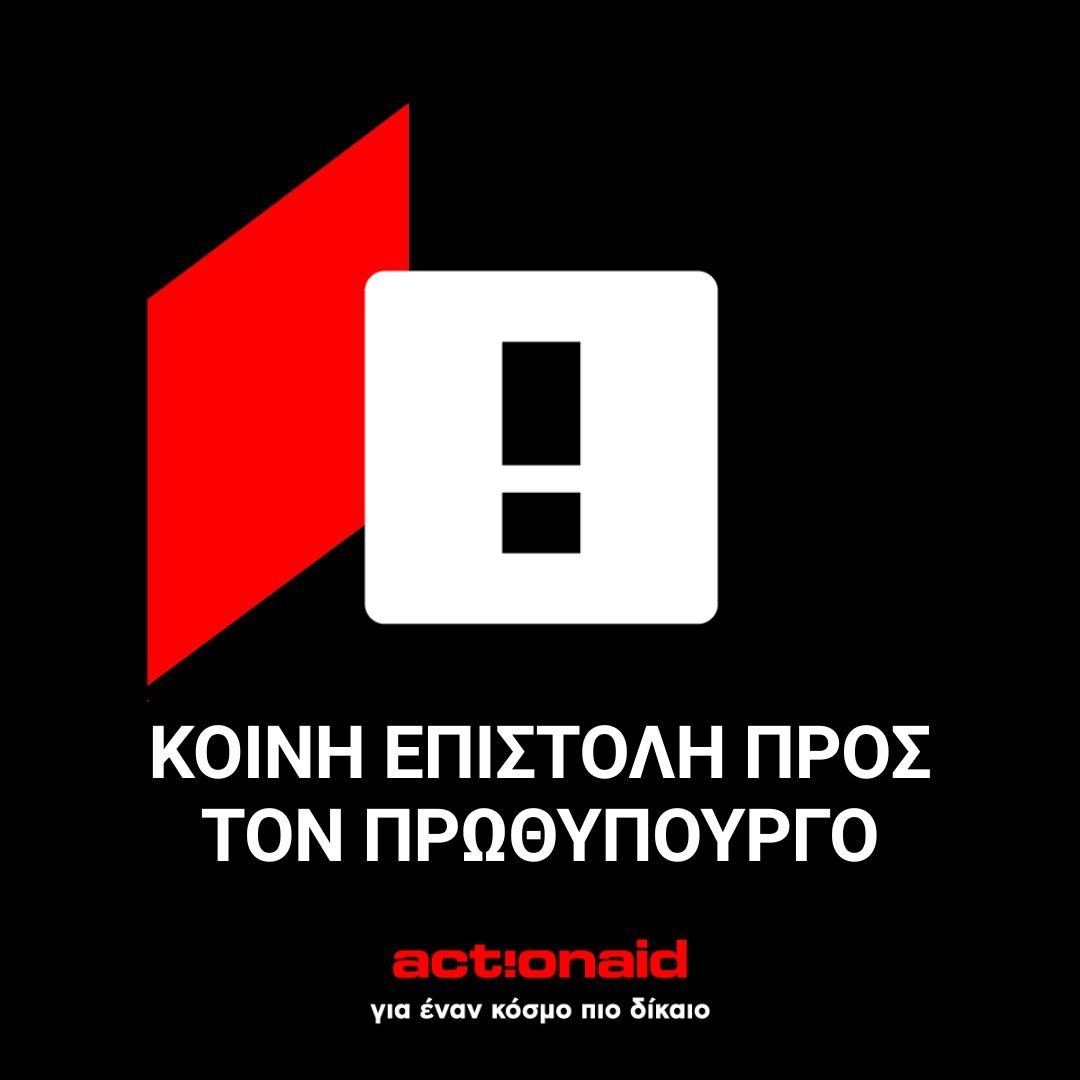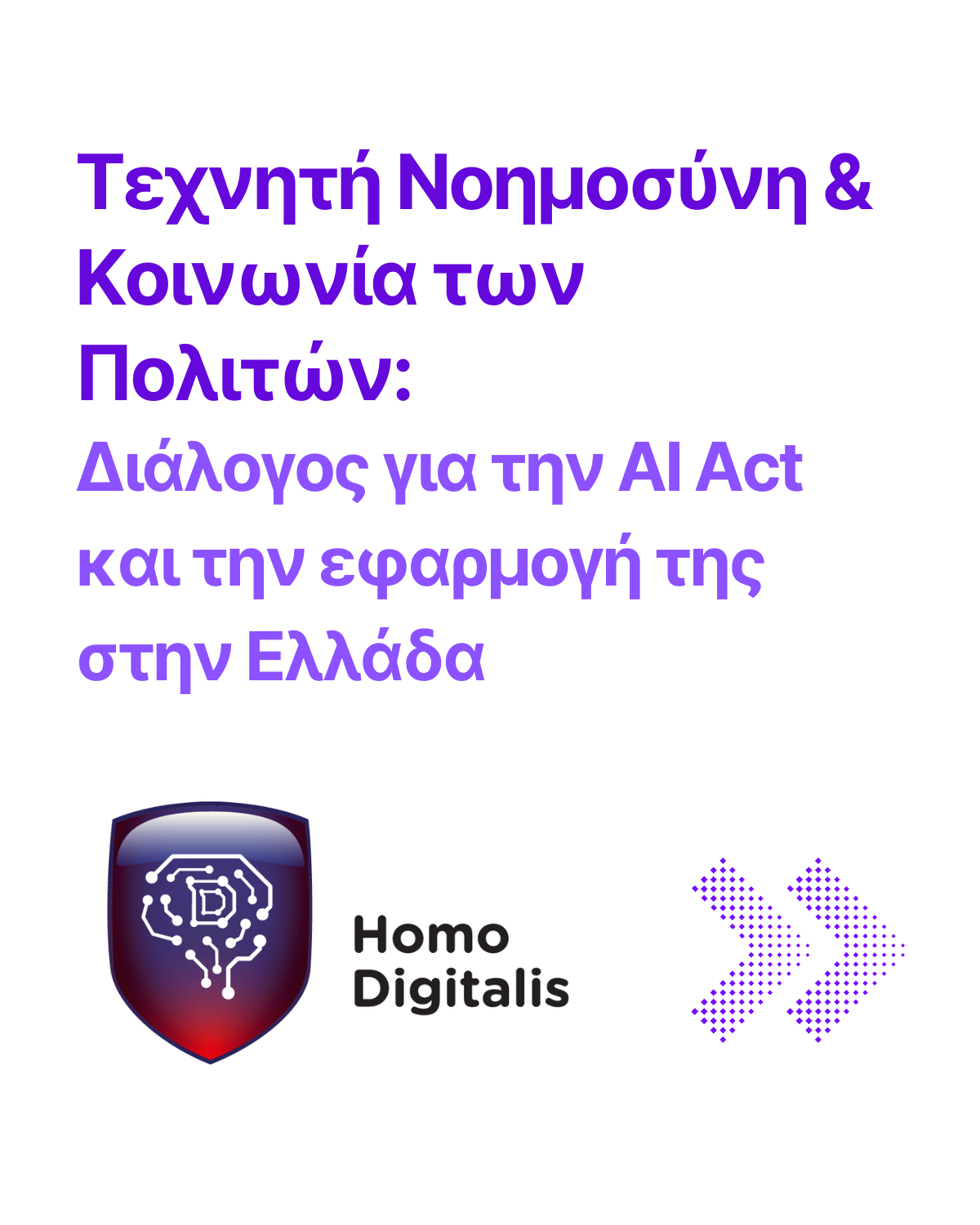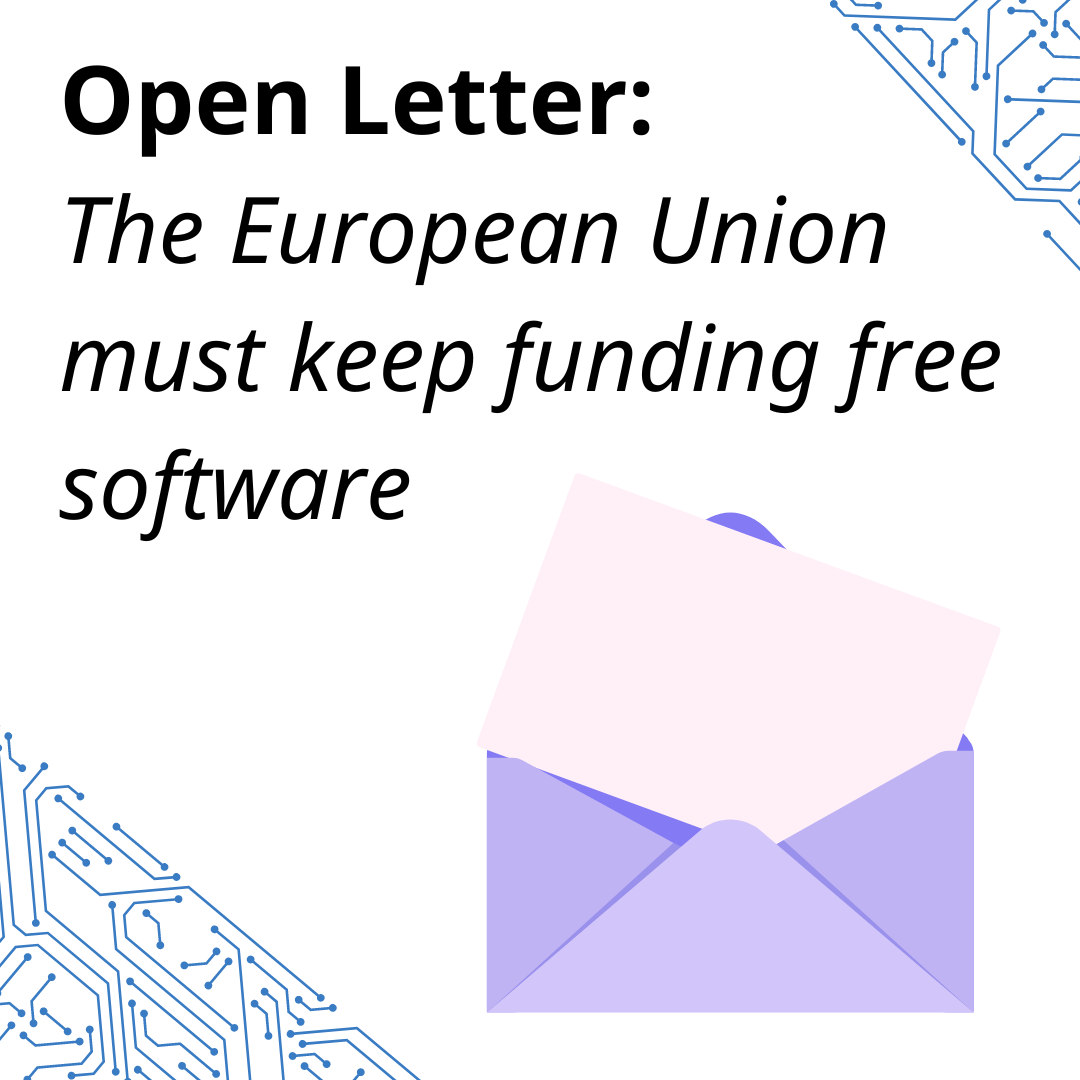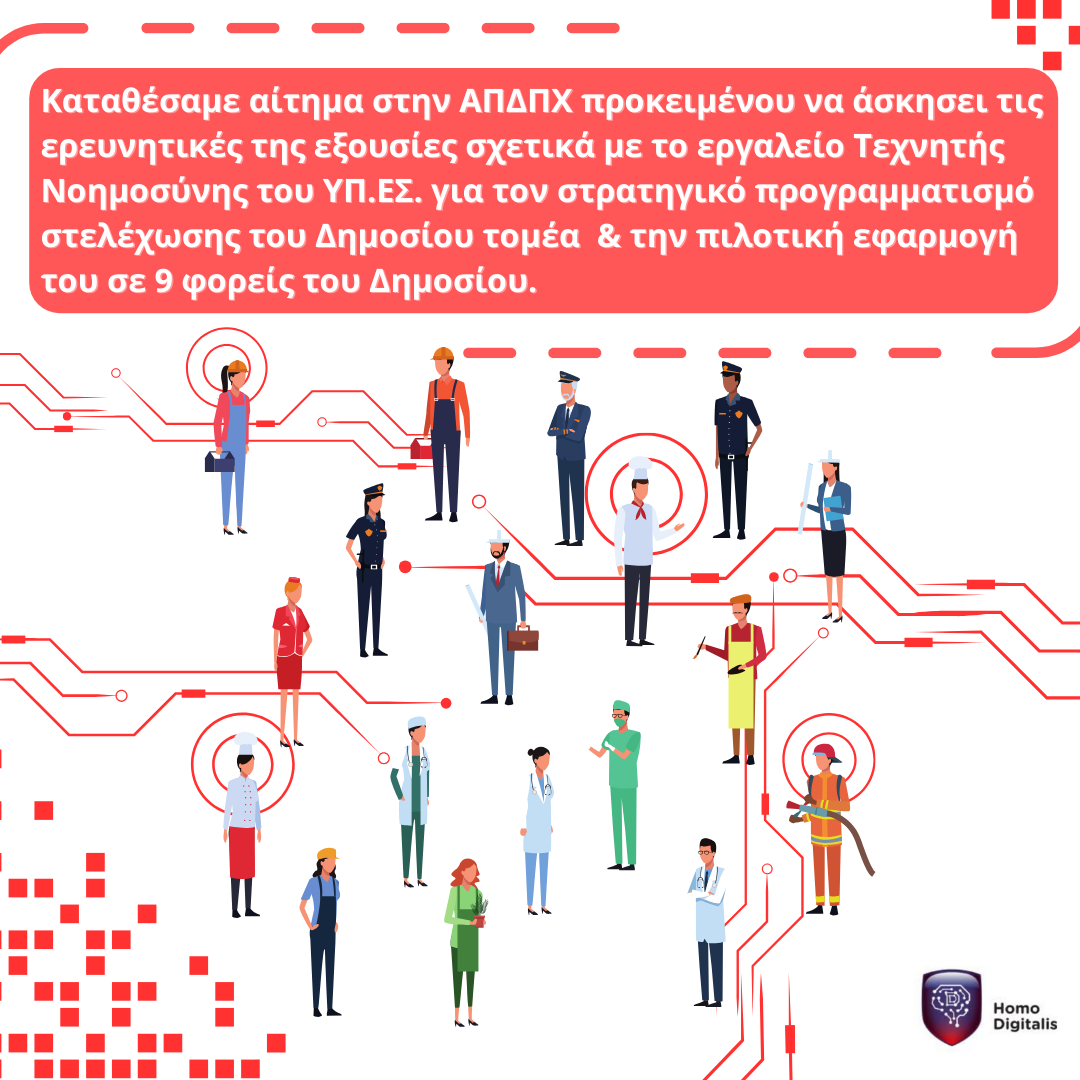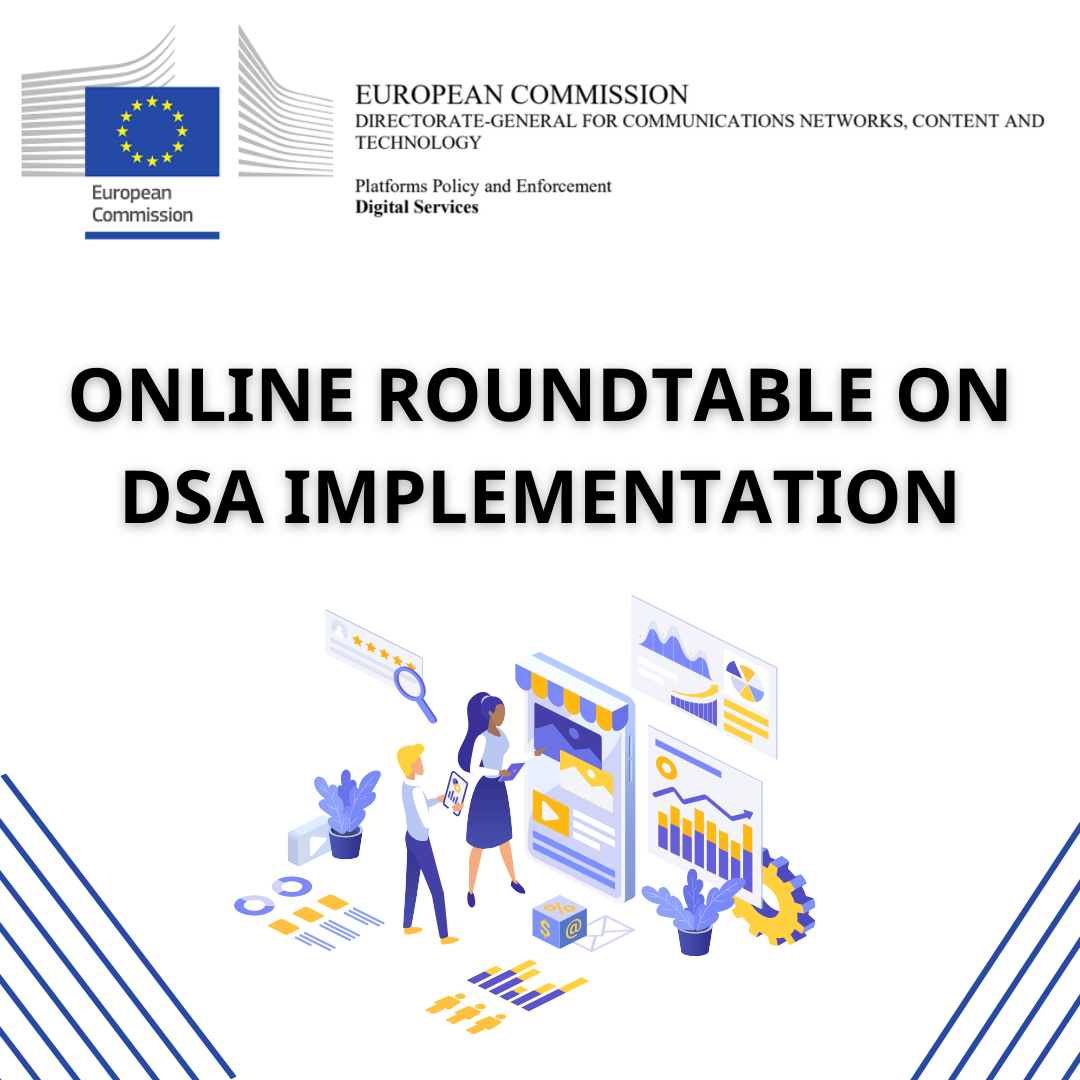Joint Letter of 67 Civil Society Organizations to the Prime Minister
Yesterday, together with 66 other Civil Society Organizations and Networks, we joined our voices and co-signed a joint letter initiated by ActionAid Hellas to Prime Minister Kyriakos Mitsotakis, in response to recent statements by government officials that disparage, in their entirety, the work and transparency of CSOs.
The letter, titled “The disparagement of Civil Society Organizations undermines society itself and the institutional functioning of Democracy”, is a collective effort that sends a strong message in every direction.
Civil Society is all of us. We deserve respect, cooperation, and open dialogue. Read our open letter here.
Homo Digitalis Event on the AI Act and opportunities for synergies for Civil Society Organizations
On Thursday, February 27, Homo Digitalis organized the first-ever workshop on the AI Act for Civil Society Organizations in Greece at its offices in ViOS Coworking Space!
More than 20 organizations participated, coming from diverse backgrounds but sharing a common interest: collaborating on the challenges and opportunities arising from the AI Act.
Event Highlights
During the event, we presented our three thematic studies on the AI Act:
-Fundamental Rights Impact Assessments (FRIAs)
-Supervisory Authorities & AI Governance Ecosystem
-Prohibited Practices
We also hosted thematic discussion groups on four key topics:
-Environment & Artificial Intelligence
-Business Practices & Algorithmic Transparency
-AI in Policing & Migration
-AI Systems, Democracy & the Information Society
A Huge Thank You!
We extend our heartfelt thanks to all the organizations that participated, bringing their energy, trust, and spirit of collaboration!
A special thanks to the Homo Digitalis team for organizing the event and presenting our studies: Sofia Antonopoulou, Niki Georgakopoulou, Lamprini Gyftokosta, Tania Skrapaliori, Eleftherios Chelioudakis, and Stavroula Chousou.
Proudly Supported by:
This event was made possible with funding from the European AI & Society Fund and European Digital Rights—we are incredibly proud of their support!
Join Us!
Want to be part of this collaborative effort? Fill out the contact form on our website!
Participating Organizations:
ActionAid Hellas, KEAN – Cell of Alternative Youth Activities, Greenpeace Greece, WWF Greece, inside story., Reporters United, Solomon, Eteron Institute, KnowledgeRights21, EKPIZO, Greek Council for Refugees, Open Lab Athens, Vouliwatch, Amnesty International – Greece, Transparency International Greece, I Have Rights., HIAS Greece, Open Technologies Organization, CopWatchGR, Hellenic League for Human Rights, omniatv, Diversity Charter Greece, Generation 2.0 for Rights, Equality and Diversity.
The European Union must keep funding free software
Open Letter to the European Commission.
Since 2020, Next Generation Internet (NGI) programmes, part of European Commission’s Horizon programme, fund free software in Europe using a cascade funding mechanism (see for example NLnet’s calls). This year, according to the Horizon Europe working draft detailing funding programmes for 2025, we notice that Next Generation Internet is not mentioned any more as part of Cluster 4.
NGI programmes have shown their strength and importance to supporting the European software infrastructure, as a generic funding instrument to fund digital commons and ensure their long-term sustainability. We find this transformation incomprehensible, moreover when NGI has proven efficient and economical to support free software as a whole, from the smallest to the most established initiatives. This ecosystem diversity backs the strength of European technological innovation, and maintaining the NGI initiative to provide structural support to software projects at the heart of worldwide innovation is key to enforce the sovereignty of a European infrastructure.
Contrary to common perception, technical innovations often originate from European rather than North American programming communities, and are mostly initiated by small-scaled organizations.
Previous Cluster 4 allocated 27 million euros to:
- “Human centric Internet aligned with values and principles commonly shared in Europe” ;
- “A flourishing internet, based on common building blocks created within NGI, that enables better control of our digital life” ;
- “A structured ecosystem of talented contributors driving the creation of new internet commons and the evolution of existing internet commons”.
In the name of these challenges, more than 500 projects received NGI funding in the first 5 years, backed by 18 organisations managing these European funding consortia.
NGI contributes to a vast ecosystem, as most of its budget is allocated to fund third parties by the means of open calls, to structure commons that cover the whole Internet scope – from hardware to application, operating systems, digital identities or data traffic supervision. This third-party funding is not renewed in the current program, leaving many projects short on resources for research and innovation in Europe.
Moreover, NGI allows exchanges and collaborations across all the Euro zone countries as well as “widening countries” [1:1], currently both a success and an ongoing progress, likewise the Erasmus programme before us. NGI also contributes to opening and supporting longer relationships than strict project funding does. It encourages implementing projects funded as pilots, backing collaboration, identification and reuse of common elements across projects, interoperability in identification systems and beyond, and setting up development models that mix diverse scales and types of European funding schemes.
While the USA, China or Russia deploy huge public and private resources to develop software and infrastructure that massively capture private consumer data, the EU can’t afford this renunciation.
Free and open source software, as supported by NGI since 2020, is by design the opposite of potential vectors for foreign interference. It lets us keep our data local and favors a community-wide economy and know-how, while allowing an international collaboration.
This is all the more essential in the current geopolitical context: the challenge of technological sovereignty is central, and free software allows addressing it while acting for peace and sovereignty in the digital world as a whole.
We call on the Greek DPA to investigate the Ministry of Interior for the use of artificial intelligence algorithms for the reallocation of employees in the public sector
On 9 July Homo Digitalis filed a request (no. 5812/9.7.2024) before the Greek Data Protection Authority, in order for the latter to exercise its investigative powers against the Ministry of Interior.
In particular, following the Authority’s Decision 16/2024 in April 2024, by which it had imposed a record fine of 400,000 euros on the Ministry of Interior for significant breaches of data protection legislation, the Ministry is again in the spotlight, this time for the artificial intelligence tool it is developing for strategic staffing planning in the public sector.
The tool concerns the reallocation of existing staff and the estimation of the needs for new staff, while it will be piloted in 9 public sector institutions, namely the Development Programmes Organisation and Management Unit, the Independent Public Expenditure Authority, the Public Employment Service, the Athens General Hospital “G. Gennimatas Hospital, the Municipality of Thessaloniki, the Region of Attica, the Ministry of Education and Religious Affairs, the Ministry of Environment and Energy and the Ministry of Culture and Sports.
The project is expected to be completed in December 2025, at a cost of €11,708,543.
Because the tool needs to include functionalities for the collection, management and analysis of personal data, Homo Digitalis had filed a letter on 15 April 2024 before the then Minister of Interior Ms.Kerameos and the Data Protection Officer of the Ministry, in which it raised key questions regarding both the compliance required with the legislation on the protection of personal data and the legislation on the use of artificial intelligence and other emerging technologies in the public sector (Law 4961/2022). However, the Ministry did not provide any response, even after a written reminder of our request on 30 May, forcing us to address the DPA to investigate thoroughly the development, implementation and piloting of this tool and the implications for the rights of public sector employees.
You can see our request here (EL).
We participated in European Commission’s roundtable on the DSA enforcement
Last Monday, the 8th of July, Homo Digitalis was invited to participate in the European Commission’s Roundtable on the implementation of the Digital Services Act.
During the roundtable, the European Commission presented an updated of the various steps taken on DSA enforcement so far, highlighting how Civil Society Organizations can act as an important ally in this field. Also, the EC provided an updated on the A.28 Guidelines with regard to the Protection of Minors.
Next, the CSOs that participated in the roundtable had the opportunity to share with the European Commission their current activities, expertise and project capacities in key areas of the implementation of the DSA and exchange views on activities and plans.
We would like to thank the European Commission for this important opportunity to engage with CSOs and their kind invitation to participate in this roundtable. It remains to be seen if national authorities at Greek level, will follow a similar approach and invite Homo Digitalis and other CSOs to a fruitful dialogue with regard to the enforcement of the DSA and the Greek Law 5099/2024.
Our team was represented in the roundtable by Eleftherios Chelioudakis.
